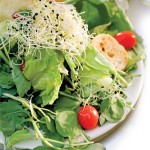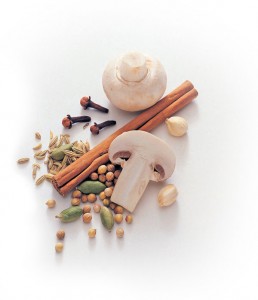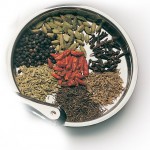
If your heart could choose where you?should live, it might tell you to move to?one of the lovely countries that border?the Mediterranean Sea. The level of?heart disease there is much lower than?other places in the world. Why? Experts?believe that the Mediterranean style of eating?protects against heart disease. And it may?offer even more: Studies show that this way?of eating may also lower the risk of some?types of cancer, obesity and type 2 diabetes.?It may even help prevent Parkinson’s and?Alzheimer’s diseases. The good news is that you don’t have to?pack up and move to Greece or Italy. You?can follow the Mediterranean way of eating?in your very own home. All you need to do?is follow the Mediterranean Diet Pyramid,?adjusting the size of the servings to meet your?daily needs. Read on for more details on how?to fill your plate the Mediterranean way. EVERY MAIN MEAL Eat one or two servings of fruit.?A serving is a small piece of fruit, ? cup?of berries or 17 grapes. Choose fresh fruit?instead of juice or fruit canned in syrup. If?you worry that fruit may raise your blood?glucose level too high, try those that have?a lower glycemic index (GI) value. The?natural sugar found in foods with a lower?GI value enters the bloodstream more?slowly. Good choices include apples,?oranges, strawberries and blueberries. Eat two servings of vegetables (at?least one should be raw). A serving is?? cup cooked or 1 cup of raw vegetables.?You can even fit veggies into your breakfast?menu: Try drinking a glass of low sodium?tomato juice to start your?day. Add tomatoes, onions?and peppers to an?omelet or scrambled?eggs. As your day?goes on, enjoy?more vegetable juice, salads and cooked,?steamed or raw vegetables. Vegetable-rich?soups are great, too. Eat one or two servings of foods that?contain fiber-rich grains. These include?whole grain bread, pasta, rice or couscous.?One serving of a grain food is one slice?(1 ounce) of bread or 1/3 cup of cooked?pasta, rice or couscous. The whole grain?versions of these foods provide a lot?of healthy nutrients that are?lost when the fiber?is taken out. EVERY DAY Drink plenty of water. Some people?need to drink more than others, but?everyone needs to drink some. When?you are well hydrated, your body?will function better. Seltzer water?and herbal tea count as water, too. Eat two servings of low-fat dairy in?the form of milk, yogurt or cheese.?These all help make your bones stronger.?Remember that milk and yogurt are?considered to be carbohydrate-based foods?(one serving is 8 ounces of milk or ? cup?yogurt), while cheese is a protein food. Enjoy olives, nuts and seeds. If you?combine these heart-healthy foods?with different spices, you can make?your Mediterranean Diet meals quite?tasty. If you wish to lose some weight, limit?the amount you eat from this group,?as these foods are high in fat and calories. Use olive oil as your main fat choice.?Olive oil helps lower the LDL (bad)?cholesterol that clogs blood vessels. Olive?oil is rich in calories, so use it in smaller?amounts. The best type to use is extra?virgin. It also has the richest flavor, so you?don’t need to use a lot. Enjoy some wine. A small amount of?wine each day may help lower your risk of?heart disease. Women should limit their?daily intake to one glass (5 ounces). Men?should limit their daily intake to no more?than two glasses (10 ounces). Don’t drink?wine if you have a problem with alcohol,?or if your healthcare provider tells you?that it is not safe for you to do so. WEEKLY Eat two or more servings of?fish, two servings of lean meat?and two to four servings of?eggs. All of these are great sources of?protein. Fish and seafood are rich in heart-healthy?fats. Vegetable oil, nuts and fish?contain heart-healthy omega-3 fatty acids,?which help lower triglycerides (a type of?blood fat), help make your blood vessels?healthier, and may help prevent heart?attacks. Try to avoid processed meat.?Processed meat includes hot dogs,?bacon and cold cuts. These foods?are high in sodium and, often,?unhealthy saturated fat. If you must?have some, limit your intake to no?more than one serving per week. Eat two or more servings of legumes,?such as beans, peas and lentils. These?protein-rich foods are cholesterol-free, high?in fiber and tend to be low in fat. Legumes?contain carbohydrates, as well, so be sure to?count them as one of your carb choices in?your eating plan. One serving of legumes?is ? cup. Limit your intake of potatoes.?Experts who studied the value of the?Mediterranean Diet in people who?have diabetes asked them not to eat?any potatoes. But if you wish to have some,?limit your servings to three or fewer. Limit your sweets. Have two or fewer?servings of sweets, such as cookies, ice?cream and candy each week. WHAT ELSE CAN YOU DO? The Mediterranean?Diet also encourages?several non-food?actions: daily?physical activity, rest?and good times with friends. How you?live your life affects?your heart and other?areas of your body.?If you get plenty of?rest, and are social?and active, your?stress level will be?lower. This way of eating?and living may differ?from how you live?right now, but you?and your heart may?find it worthwhile. By Janis Roszler, MSFT, RD, CDE, LD/N
The post Eat A Heart Healthy Diet appeared first on Spring 2016 Issue | CDiabetes Online Magazine.
]]>
If your heart could choose where you?should live, it might tell you to move to?one of the lovely countries that border?the Mediterranean Sea. The level of?heart disease there is much lower than?other places in the world. Why? Experts?believe that the Mediterranean style of eating?protects against heart disease. And it may?offer even more: Studies show that this way?of eating may also lower the risk of some?types of cancer, obesity and type 2 diabetes.?It may even help prevent Parkinson’s and?Alzheimer’s diseases.
The good news is that you don’t have to?pack up and move to Greece or Italy. You?can follow the Mediterranean way of eating?in your very own home. All you need to do?is follow the Mediterranean Diet Pyramid,?adjusting the size of the servings to meet your?daily needs. Read on for more details on how?to fill your plate the Mediterranean way.
EVERY MAIN MEAL
![]() Eat one or two servings of fruit.?A serving is a small piece of fruit, ? cup?of berries or 17 grapes. Choose fresh fruit?instead of juice or fruit canned in syrup. If?you worry that fruit may raise your blood?glucose level too high, try those that have?a lower glycemic index (GI) value. The?natural sugar found in foods with a lower?GI value enters the bloodstream more?slowly. Good choices include apples,?oranges, strawberries and blueberries.
Eat one or two servings of fruit.?A serving is a small piece of fruit, ? cup?of berries or 17 grapes. Choose fresh fruit?instead of juice or fruit canned in syrup. If?you worry that fruit may raise your blood?glucose level too high, try those that have?a lower glycemic index (GI) value. The?natural sugar found in foods with a lower?GI value enters the bloodstream more?slowly. Good choices include apples,?oranges, strawberries and blueberries.

![]() Eat two servings of vegetables (at?least one should be raw). A serving is?? cup cooked or 1 cup of raw vegetables.?You can even fit veggies into your breakfast?menu: Try drinking a glass of low sodium?tomato juice to start your?day. Add tomatoes, onions?and peppers to an?omelet or scrambled?eggs. As your day?goes on, enjoy?more vegetable juice, salads and cooked,?steamed or raw vegetables. Vegetable-rich?soups are great, too.
Eat two servings of vegetables (at?least one should be raw). A serving is?? cup cooked or 1 cup of raw vegetables.?You can even fit veggies into your breakfast?menu: Try drinking a glass of low sodium?tomato juice to start your?day. Add tomatoes, onions?and peppers to an?omelet or scrambled?eggs. As your day?goes on, enjoy?more vegetable juice, salads and cooked,?steamed or raw vegetables. Vegetable-rich?soups are great, too.
![]() Eat one or two servings of foods that?contain fiber-rich grains. These include?whole grain bread, pasta, rice or couscous.?One serving of a grain food is one slice?(1 ounce) of bread or 1/3 cup of cooked?pasta, rice or couscous. The whole grain?versions of these foods provide a lot?of healthy nutrients that are?lost when the fiber?is taken out.
Eat one or two servings of foods that?contain fiber-rich grains. These include?whole grain bread, pasta, rice or couscous.?One serving of a grain food is one slice?(1 ounce) of bread or 1/3 cup of cooked?pasta, rice or couscous. The whole grain?versions of these foods provide a lot?of healthy nutrients that are?lost when the fiber?is taken out.
EVERY DAY
![]() Drink plenty of water. Some people?need to drink more than others, but?everyone needs to drink some. When?you are well hydrated, your body?will function better. Seltzer water?and herbal tea count as water, too.
Drink plenty of water. Some people?need to drink more than others, but?everyone needs to drink some. When?you are well hydrated, your body?will function better. Seltzer water?and herbal tea count as water, too.
![]() Eat two servings of low-fat dairy in?the form of milk, yogurt or cheese.?These all help make your bones stronger.?Remember that milk and yogurt are?considered to be carbohydrate-based foods?(one serving is 8 ounces of milk or ? cup?yogurt), while cheese is a protein food.
Eat two servings of low-fat dairy in?the form of milk, yogurt or cheese.?These all help make your bones stronger.?Remember that milk and yogurt are?considered to be carbohydrate-based foods?(one serving is 8 ounces of milk or ? cup?yogurt), while cheese is a protein food.

![]() Enjoy olives, nuts and seeds. If you?combine these heart-healthy foods?with different spices, you can make?your Mediterranean Diet meals quite?tasty. If you wish to lose some weight, limit?the amount you eat from this group,?as these foods are high in fat and calories.
Enjoy olives, nuts and seeds. If you?combine these heart-healthy foods?with different spices, you can make?your Mediterranean Diet meals quite?tasty. If you wish to lose some weight, limit?the amount you eat from this group,?as these foods are high in fat and calories.
![]() Use olive oil as your main fat choice.?Olive oil helps lower the LDL (bad)?cholesterol that clogs blood vessels. Olive?oil is rich in calories, so use it in smaller?amounts. The best type to use is extra?virgin. It also has the richest flavor, so you?don’t need to use a lot.
Use olive oil as your main fat choice.?Olive oil helps lower the LDL (bad)?cholesterol that clogs blood vessels. Olive?oil is rich in calories, so use it in smaller?amounts. The best type to use is extra?virgin. It also has the richest flavor, so you?don’t need to use a lot.
![]() Enjoy some wine. A small amount of?wine each day may help lower your risk of?heart disease. Women should limit their?daily intake to one glass (5 ounces). Men?should limit their daily intake to no more?than two glasses (10 ounces). Don’t drink?wine if you have a problem with alcohol,?or if your healthcare provider tells you?that it is not safe for you to do so.
Enjoy some wine. A small amount of?wine each day may help lower your risk of?heart disease. Women should limit their?daily intake to one glass (5 ounces). Men?should limit their daily intake to no more?than two glasses (10 ounces). Don’t drink?wine if you have a problem with alcohol,?or if your healthcare provider tells you?that it is not safe for you to do so.
WEEKLY
![]() Eat two or more servings of?fish, two servings of lean meat?and two to four servings of?eggs. All of these are great sources of?protein. Fish and seafood are rich in heart-healthy?fats. Vegetable oil, nuts and fish?contain heart-healthy omega-3 fatty acids,?which help lower triglycerides (a type of?blood fat), help make your blood vessels?healthier, and may help prevent heart?attacks.
Eat two or more servings of?fish, two servings of lean meat?and two to four servings of?eggs. All of these are great sources of?protein. Fish and seafood are rich in heart-healthy?fats. Vegetable oil, nuts and fish?contain heart-healthy omega-3 fatty acids,?which help lower triglycerides (a type of?blood fat), help make your blood vessels?healthier, and may help prevent heart?attacks.

![]() Try to avoid processed meat.?Processed meat includes hot dogs,?bacon and cold cuts. These foods?are high in sodium and, often,?unhealthy saturated fat. If you must?have some, limit your intake to no?more than one serving per week.
Try to avoid processed meat.?Processed meat includes hot dogs,?bacon and cold cuts. These foods?are high in sodium and, often,?unhealthy saturated fat. If you must?have some, limit your intake to no?more than one serving per week.
![]() Eat two or more servings of legumes,?such as beans, peas and lentils. These?protein-rich foods are cholesterol-free, high?in fiber and tend to be low in fat. Legumes?contain carbohydrates, as well, so be sure to?count them as one of your carb choices in?your eating plan. One serving of legumes?is ? cup.
Eat two or more servings of legumes,?such as beans, peas and lentils. These?protein-rich foods are cholesterol-free, high?in fiber and tend to be low in fat. Legumes?contain carbohydrates, as well, so be sure to?count them as one of your carb choices in?your eating plan. One serving of legumes?is ? cup.
![]() Limit your intake of potatoes.?Experts who studied the value of the?Mediterranean Diet in people who?have diabetes asked them not to eat?any potatoes. But if you wish to have some,?limit your servings to three or fewer.
Limit your intake of potatoes.?Experts who studied the value of the?Mediterranean Diet in people who?have diabetes asked them not to eat?any potatoes. But if you wish to have some,?limit your servings to three or fewer.
![]() Limit your sweets. Have two or fewer?servings of sweets, such as cookies, ice?cream and candy each week.
Limit your sweets. Have two or fewer?servings of sweets, such as cookies, ice?cream and candy each week.
WHAT ELSE CAN YOU DO?
 The Mediterranean?Diet also encourages?several non-food?actions: daily?physical activity, rest?and good times with
The Mediterranean?Diet also encourages?several non-food?actions: daily?physical activity, rest?and good times with
friends. How you?live your life affects?your heart and other?areas of your body.?If you get plenty of?rest, and are social?and active, your?stress level will be?lower.
This way of eating?and living may differ?from how you live?right now, but you?and your heart may?find it worthwhile.
By Janis Roszler, MSFT, RD, CDE, LD/N
The post Eat A Heart Healthy Diet appeared first on Spring 2016 Issue | CDiabetes Online Magazine.
]]>
Many people with diabetes have heart disease. What foods, vitamins and supplements can help? Start with fish and fish oils. Oily fish—such as salmon, mackerel, lake trout, herring, sardines and albacore tuna— contain two helpful omega-3 fatty acids: EPA and DHA. Fish oil capsules usually have stronger doses of EPA and DHA. Canned tuna and salmon have the highest levels of omega 3 fats. The American Heart Association (AHA) suggests people with heart disease get 1,000 mg of fi sh oil per day and people with a high triglyceride level get 2,000–4,000 mg. Research shows omega-3 fats can: lower the incidence of an irregular heartbeat, which can lead to sudden death from a heart attack or stroke. lower triglycerides in people whose levels are high. reduce buildup of plaque on artery walls, which slows down the narrowing of the heart’s arteries. prevent blood clots from forming and keep the clots from sticking to artery walls. That helps prevent heart attack and stroke. improve health of arteries. lower blood pressure slightly. enhance the power of medicines called statins, which help improve cholesterol levels. Flaxseed and fl axseed oil also?have omega-3 fatty acids, which?may help reduce triglyceride?levels and improve good?cholesterol (HDL) levels.?Flaxseed oil is available in?liquid and capsule form Many people with diabetes are interested in finding vitamins and minerals that will keep their blood glucose level within target range. Here are a few products that show promise in studies, although more research is needed before all of their effects are known: ALPHA LIPOIC ACID (ALA) ALA is an acid found in the body that helps convert glucose to energy. It is also an antioxidant that may help prevent the damage free radicals may do to the body. A free radical is a molecule that can cause cells to malfunction, which can lead to complications from diabetes, such as kidney damage, eye disease and nerve damage. ALA helps reduce the burning, pain, numbness and tingling of diabetes-related neuropathy (nerve damage). It may also improve insulin sensitivity and blood glucose control in people with type 2 diabetes. It may take a few?weeks to see results. CHROMIUM Chromium is a mineral the body needs to keep blood glucose levels in a healthy range. It may help lower blood glucose levels and improve blood fats in people with type 2 diabetes whose levels are too high. Chromium?picolinate is a form that seems to be absorbed best. Studies show combining chromium picolinate with?biotin is effective. Biotin is a b vitamin that helps break down carbohydrate, fat and protein. CINNAMON Based on early studies, cinnamon was thought to improve type 2 diabetes and high cholesterol levels. However, newer studies show more research must be done to confirm its effectiveness. Many people enjoy adding cinnamon to their food to see if it will make a difference for them. The recommended amount to try is about 1?3 teaspoon. FENUGREEK Several studies show that Fenugreek helps lower blood glucose and bad (LDL) cholesterol levels and raises good (HDL) cholesterol levels in people with diabetes. GARLIC Garlic appears to have antioxidant effects. It also may lower blood glucose by increasing the release of insulin,?lower blood pressure, and improve blood fats. GINSENG (AMERICAN) Studies show that ginseng lowers blood glucose. It appears to do so by slowing the breakdown of carbohydrates in?the body. It may take a few weeks to see benefits. GYMNEMA SYLVESTRE Gymnema was first used in India more than 2,000 years ago to treat diabetes. It may help insulin and other oral diabetes medicines work better but must be studied further. Magnesium The body needs magnesium to break down carbohydrates and improve the way insulin works. Low levels of magnesium?have been linked to higher blood glucose levels and insulin resistance in adults. VITAMIN D Recent studies show vitamin D may help the body make insulin and use it better. A lack of vitamin D has been found in many people with type 2 diabetes, and in some people who already have pre-diabetes. For those who get enough sunlight, 400 IU of vitamin D is recommended. If you cannot go in the sun, you may benefit from 1,000 IU per day. Those who are concerned about osteoporosis should take calcium with vitamin D. ANTIOXIDANTS Vitamins C and E are antioxidants that may lower your heart disease risk by preventing bad (LDL) cholesterol from?producing plaque that narrows arteries. Vitamin E also may help keep your heart healthy. Try to eat a diet high in vitamin E, which is found in green leafy vegetables, nuts and vegetable oils. Vitamin E works better when combined with vitamin C, so try to take these vitamins together. The recom mended daily intake of vitamin C for men over the age of 18 is 90 mg per day, and for women over the age of 18, 75 mg per day. Smoking raises the body’s need for vitamin C. B VITAMINS The AHA suggests that people who are at high risk for, or already have heart disease, should get folate, B6 and B12?into their diets. One way to get these nutrients is to eat a lot of vegetables. Or, take a daily multivitamin and mineral supplement that provides 100 percent of the Recommended Daily Allowance (RDA) for folic acid, B6 and B12. Recent studies suggest vitamin B12 helps the brain think more clearly, and may help prevent age-related decline ?in brain function. NIACIN Niacin is a B vitamin that lowers total cholesterol, LDL (bad) cholesterol and triglyceride levels, while raising HDL (good) cholesterol levels. Niacin supplements should only be taken under the supervision of your physician because of potential side effects such as flushing or hot flashes. The average daily dose of niacin is 1.5–3 grams per day. COENZYME-Q10 Co-Q10 is a natural antioxidant made in the heart, pancreas and kidneys. It helps cells produce energy and keeps?the heart healthy. If a person has already had a heart attack, Co-Q10 can help prevent future heart problems. Some heart medicines, such as statins, interfere with the...
The post Vitamins, Minerals & Glucose Control appeared first on Spring 2016 Issue | CDiabetes Online Magazine.
]]>
Many people with diabetes have heart disease. What foods, vitamins and supplements can help?
Start with fish and fish oils. Oily fish—such as salmon, mackerel, lake trout, herring, sardines and albacore tuna— contain two helpful omega-3 fatty acids: EPA and DHA. Fish oil capsules usually have stronger doses of EPA and DHA.
Canned tuna and salmon have the highest levels of omega 3 fats. The American Heart Association (AHA) suggests people with heart disease get 1,000 mg of fi sh oil per day and people with a high triglyceride level get 2,000–4,000 mg.
Research shows omega-3 fats can:
- lower the incidence of an irregular heartbeat, which can lead to sudden death from a heart attack or stroke.
- lower triglycerides in people whose levels are high.
- reduce buildup of plaque on artery walls, which slows down the narrowing of the heart’s arteries.
- prevent blood clots from forming and keep the clots from sticking to artery walls. That helps prevent heart attack and stroke.
- improve health of arteries.
- lower blood pressure slightly.
- enhance the power of medicines called statins, which help improve cholesterol levels.
Flaxseed and fl axseed oil also?have omega-3 fatty acids, which?may help reduce triglyceride?levels and improve good?cholesterol (HDL) levels.?Flaxseed oil is available in?liquid and capsule form
Many people with diabetes are interested in finding vitamins and minerals that will keep their blood glucose level within target range. Here are a few products that show promise in studies, although more research is needed before all of their effects are known:
ALPHA LIPOIC ACID (ALA)
ALA is an acid found in the body that helps convert glucose to energy. It is also an antioxidant that may help prevent the damage free radicals may do to the body. A free radical is a molecule that can cause cells to malfunction, which can lead to complications from diabetes, such as kidney damage, eye disease and nerve damage.
ALA helps reduce the burning, pain, numbness and tingling of diabetes-related neuropathy (nerve damage). It may
also improve insulin sensitivity and blood glucose control in people with type 2 diabetes. It may take a few?weeks to see results.
CHROMIUM
Chromium is a mineral the body needs to keep blood glucose levels in a healthy range. It may help lower blood
glucose levels and improve blood fats in people with type 2 diabetes whose levels are too high. Chromium?picolinate is a form that seems to be absorbed best. Studies show combining chromium picolinate with?biotin is effective. Biotin is a b vitamin that helps break down carbohydrate, fat and protein.
CINNAMON
Based on early studies, cinnamon was thought to improve type 2 diabetes and high cholesterol levels. However,
newer studies show more research must be done to confirm its effectiveness. Many people enjoy adding cinnamon
to their food to see if it will make a difference for them. The recommended amount to try is about 1?3 teaspoon.
FENUGREEK
Several studies show that Fenugreek helps lower blood glucose and bad (LDL) cholesterol levels and raises good (HDL) cholesterol levels in people with diabetes.
GARLIC
Garlic appears to have antioxidant effects. It also may lower blood glucose by increasing the release of insulin,?lower blood pressure, and improve blood fats.
GINSENG (AMERICAN)
Studies show that ginseng lowers blood glucose. It appears to do so by slowing the breakdown of carbohydrates in?the body. It may take a few weeks to see benefits.
GYMNEMA SYLVESTRE
Gymnema was first used in India more than 2,000 years ago to treat diabetes. It may help insulin and other oral diabetes medicines work better but must be studied further.
Magnesium
The body needs magnesium to break down carbohydrates and improve the way insulin works. Low levels of magnesium?have been linked to higher blood glucose levels and insulin resistance in adults.
VITAMIN D
Recent studies show vitamin D may help the body make insulin and use it better. A lack of vitamin D has been found in many people with type 2 diabetes, and in some people who already have pre-diabetes. For those who get enough sunlight, 400 IU of vitamin D is recommended. If you cannot go in the sun, you may benefit from 1,000 IU per day. Those who are concerned about osteoporosis should take calcium with vitamin D.
ANTIOXIDANTS
Vitamins C and E are antioxidants that may lower your heart disease risk by preventing bad (LDL) cholesterol from?producing plaque that narrows arteries. Vitamin E also may help keep your heart healthy. Try to eat a diet high in vitamin E, which is found in green leafy vegetables, nuts and vegetable oils. Vitamin E works better when combined with vitamin C, so try to take these vitamins together. The recom mended daily intake of vitamin C for men over the age of 18 is 90 mg per day, and for women over the age of 18, 75 mg per day. Smoking raises the body’s need for vitamin C.
B VITAMINS
The AHA suggests that people who are at high risk for, or already have heart disease, should get folate, B6 and B12?into their diets. One way to get these nutrients is to eat a lot of vegetables. Or, take a daily multivitamin and mineral supplement that provides 100 percent of the Recommended Daily Allowance (RDA) for folic acid, B6 and B12. Recent studies suggest vitamin B12 helps the brain think more clearly, and may help prevent age-related decline ?in brain function.
NIACIN
Niacin is a B vitamin that lowers total cholesterol, LDL (bad) cholesterol and triglyceride levels, while raising HDL (good) cholesterol levels. Niacin supplements should only be taken under the supervision of your physician because of potential side effects such as flushing or hot flashes. The average daily dose of niacin is 1.5–3 grams per day.
COENZYME-Q10
Co-Q10 is a natural antioxidant made in the heart, pancreas and kidneys. It helps cells produce energy and keeps?the heart healthy. If a person has already had a heart attack, Co-Q10 can help prevent future heart problems. Some heart medicines, such as statins, interfere with the body’s production of Co-Q10. Heart disease also can lower?the body’s level of that helpful product. The best way to maintain a healthy level of Co-Q10 in your body is to take a supplement. ?The recommended dose for adults is 30–200 mg per day.
PLANT STANOLS AND STEROLS
Plant stanols and sterols are natural substances found in fruits and vegetables. They can help lower bad (LDL) cholesterol by up to 15% and lower the risk of heart disease. They can also work with cholesterol-lowering medications, such as statins, to lower the body’s LDL level. Smaller amounts of these products are also naturally found in corn oil, sunfl ower oil, olive oil, corn, beans, nuts, oranges and apples. Plant stanols and sterols also come in supplement form sometimes called betasitosterol or sitosterol.
Tell your healthcare provider about the dietary supplements you take, or ask about supplements you wish to try. They can warn you about the products that may interact with your other medicines and let you know if you need to ?stop taking any before surgery.
Reviewed by Janis Roszler, RD, CDE, LD/N
The post Vitamins, Minerals & Glucose Control appeared first on Spring 2016 Issue | CDiabetes Online Magazine.
]]>